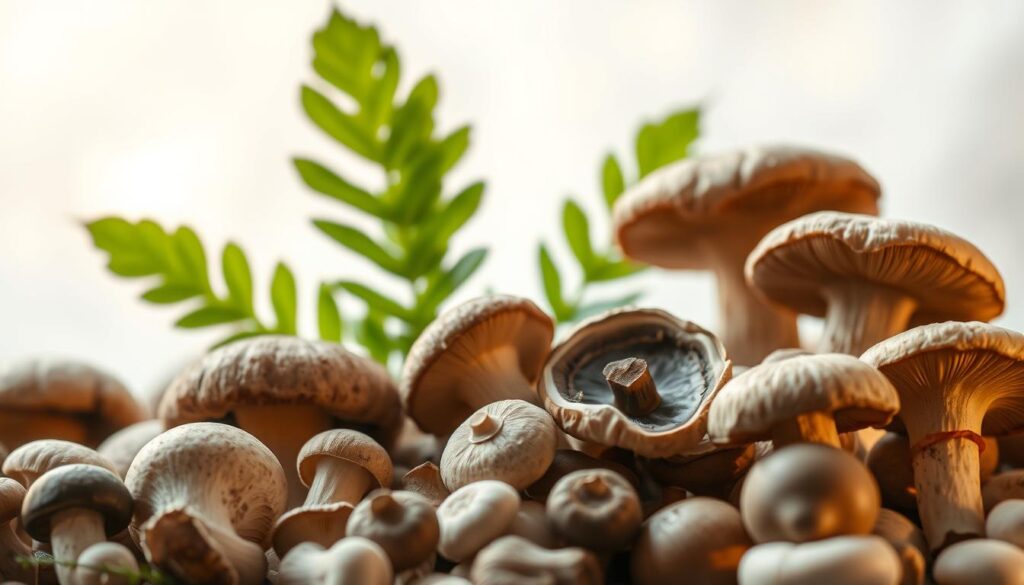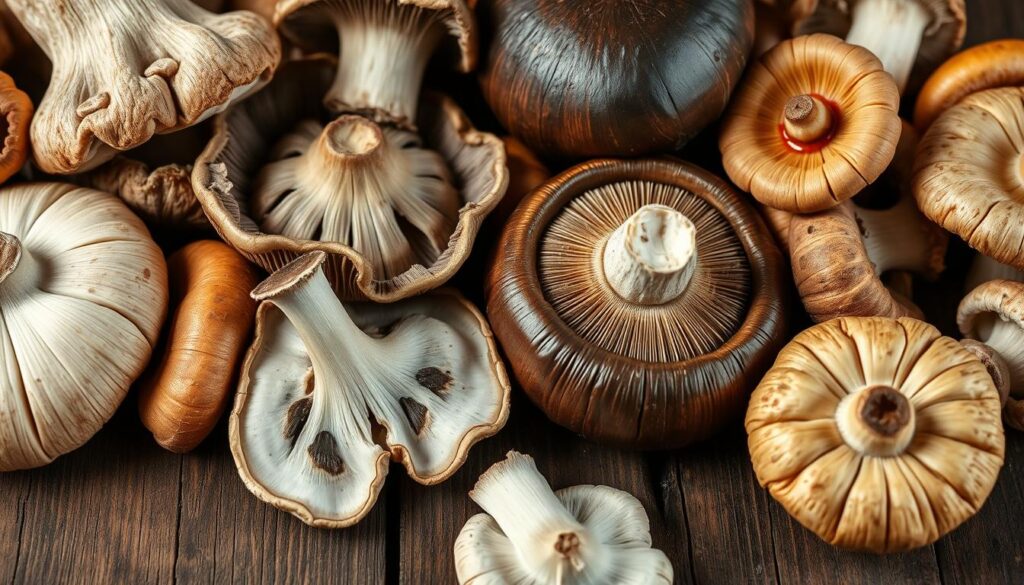What if adding mushrooms to your diet could greatly improve your health? Research shows mushrooms a type of fungi might be the answer.
They are packed with nutrients like vitamin D, B vitamins, and fiber. Mushrooms also offer health benefits that could lower the risk of chronic diseases.
Studies found eating mushrooms two or more times a week can cut the risk of mild cognitive impairment by 50%. They also help your heart by possibly lowering cholesterol and triglycerides. But what makes mushrooms special, and how can you add them to your daily meals for better health?
Key Takeaways
- Mushrooms are a rich source of essential nutrients, including vitamin D, B vitamins copper selenium fiber potassium, and more.
- Consuming two or more servings of mushrooms weekly can lower the odds of developing mild cognitive impairment by around 50%.
- Mushrooms support heart health by potentially lowering cholesterol and triglyceride levels due to their content of fiber antioxidant, and anti-inflammatory properties.
- Mushrooms contain unique prebiotic starches beneficial for gut health contributing to better digestion and a reduced risk of obesity and chronic diseases.
- The global functional mushroom market is expected to exceed $19 billion by 2030, indicating a growing interest in the health benefits of mushrooms.
- Studies on the health benefits of mushrooms focus mainly on ergothioneine and beta-glucans, which offer health advantages.
- Reishi mushrooms contain approximately 400 bioactive compounds which may provide various health benefits though many studies on them are small and unreliable.
Understanding the Fascinating World of Mushrooms
Mushrooms have been a part of human culture for centuries. They are used as food and in traditional medicine. The unique characteristics of fungi have fascinated people, leading to extensive research on their properties and benefits.
The biology behind fungi is complex. Different species have distinct features. For example some mushrooms types have high water content making up 80-90% of their weight. This makes them a popular ingredient in various cuisines adding flavor and texture without many calories.
Historically mushrooms have been used for their medicinal properties. The use of fungi in traditional medicine dates back to around 4500 BCE. The Amadou mushroom was classified as an anti-inflammatory by Hippocrates. Today research continues to uncover the benefits of mushrooms as food and their role in promoting health and well-being.

Some of the key benefits of mushrooms include their high protein and vitamin B12 content. This makes them an excellent option for vegetarians and vegans. Fungi have also been found to have antioxidant anticancer, and immunomodulating effects. These effects can contribute to their therapeutic applications.
| Mushroom Species | Medicinal Properties |
|---|---|
| Reishi | Immune system support |
| Chaga | Antioxidant properties |
| Cordyceps sinensis | Adaptogenic properties, fatigue management |
In conclusion, the world of mushrooms is fascinating and complex. Various mushrooms types offer benefits as food and in traditional medicine. As research continues their importance in human health and well-being will likely grow.
What Are the Benefits of Eating Mushrooms?
Mushrooms are packed with health benefits, making them a great choice for a healthy diet. They are full of antioxidants, vitamins, and minerals. This makes them perfect for those who want to improve their health.
They can help lower the risk of serious diseases like Alzheimer’s, heart disease cancer, and diabetes.
Some of the key health benefits of eating mushrooms include:
- High levels of potassium, which can help lower blood pressure
- Anti-inflammatory properties, which can improve immune system efficiency
- Support for weight loss when combined with exercise and lifestyle changes
- Rich in fiber, promoting healthy gut bacteria

Mushrooms are low in calories sodium, and cholesterol. They are a great substitute for red meat. This can help prevent plaque buildup in blood vessels. Their meaty texture and rich flavor make them exciting to eat.
Read more: Top 5 Diet Tips to Boost Health
Adding mushrooms to your diet can greatly improve your health. They are full of nutrients and offer many health benefits. Mushrooms are a smart choice for anyone wanting to eat better and live healthier.
| Nutrient | Amount per 1 cup of mushrooms |
|---|---|
| Calories | 15 |
| Protein | 2.2 grams |
| Fiber | 0.5 grams |
Nutritional Composition of Mushrooms
Mushrooms are packed with nutrients like vitamins, minerals, and antioxidants. They are a great source of vitamin D, with some types having up to 1200 IU per 3.5-ounce serving. They also have only about 15.4 calories per 70g serving, making them perfect for a vegan diet.
Mushrooms are full of protein, fiber, and carbs. They are also rich in minerals like selenium, calcium, and potassium. Plus, they are loaded with antioxidants that help protect cells and lower the risk of chronic diseases.

The main nutritional benefits of mushrooms include:
They are low in calories and fat.
They are high in fiber and protein.
They are rich in vitamins and minerals, including vitamin D and selenium.
They are a good source of antioxidants.
They can be used in many mushrooms recipes like soups and stir-fries.
Mushrooms are a nutritious and versatile food. They can be added to a healthy diet. With their rich nutritional value and health benefits, they are excellent for a vegan or vegetarian diet. They can also add flavor and nutrition to various mushrooms recipes.
Popular Edible Mushroom Varieties and Their Properties
Edible mushrooms are great for a healthy diet. They offer unique properties and health benefits. Some top mushrooms types are White Button Baby Bella, Portabella, and Shiitake. These edible mushrooms are tasty and full of nutrients, perfect for adding variety to meals.
A medium Portabella mushroom is rich in copper, selenium, and niacin. It has 4.3mg of ergothioneine. Four raw Shiitake mushrooms give 13% of the Daily Value for riboflavin, 12% for copper, and 23% for pantothenic acid. These mushrooms types are great in many food dishes, like salads and stir-fries.

Read more: Antioxidant Foods Nourish Your Body Naturally
- Antioxidant properties which fight oxidative stress and lower chronic disease risk
- Immune-boosting properties supporting overall health and well-being
- Essential vitamins and minerals like copper, selenium, and niacin
With many mushrooms types to pick from it’s easy to add edible mushrooms to your diet. Start enjoying the health benefits of these nutritious food options.
| Mushroom Type | Nutritional Benefits |
|---|---|
| White Button | Rich in riboflavin, niacin, and copper |
| Shiitake | High in vitamin D, B vitamins, and minerals like copper and selenium |
| Portabella | Excellent source of copper selenium, and niacin |
Medicinal Mushrooms and Their Therapeutic Effects
Medicinal mushrooms have been used for centuries in traditional medicine. They offer immune support, improve cognitive function, and have antioxidant properties. These benefits make them a great addition to a healthy diet.
Reishi for Immune Support
Reishi mushrooms boost the immune system. They have been used to increase energy and extend life. These mushrooms contain compounds like polysaccharides and terpenoids. They help regulate the immune system and reduce inflammation.
Lion’s Mane for Cognitive Function
Lion’s mane mushrooms support brain health. They may help treat diseases like Alzheimer’s and Parkinson’s. The mushrooms contain compounds like hericenones and erinacines. These have protective and regenerative effects on the brain.
Chaga for Antioxidant Properties
Chaga mushrooms are rich in antioxidants. They have been used to support overall health. The mushrooms contain compounds like polyphenols and melanin. These have antioxidant and anti-inflammatory effects.
Some key health benefits of medicinal mushrooms include:
- Immune system support
- Cognitive function support
- Antioxidant properties
- Anti-inflammatory effects
- Antiviral and antibacterial effects

Read more: Top Vitamin B1 Food Sources for a Healthy Diet
Medicinal mushrooms are a great addition to a healthy diet. They may help prevent and treat various diseases. Their benefits come from bioactive compounds that support the immune system, reduce inflammation, and act as antioxidants.
| Mushroom | Therapeutic Effect |
|---|---|
| Reishi | Immune support |
| Lion’s mane | Cognitive function support |
| Chaga | Antioxidant properties |
How to Select and Store Mushrooms Properly
When picking and storing mushrooms, food safety is key. Buy fresh mushrooms a few days before using them. Keep them in a cool spot like the fridge. This helps keep their nutrients and health benefits.
Mushrooms are mostly water so they spoil easily if not stored right. To keep them fresh, store them in a brown paper bag. This bag absorbs moisture. You can also add a paper towel to help control moisture.
Don’t use plastic bags or containers for mushrooms. They can make mushrooms soggy or moldy. Whole mushrooms last a week, while sliced ones should be used in 3 days.
Cooked mushrooms can be frozen for up to a year. Before freezing, sauté or steam them lightly. Dried mushrooms can last forever, unlike frozen ones. Watch out for signs of spoilage like sliminess dark color or smell.
- Choose fresh mushrooms with no signs of spoilage
- Store mushrooms in a cool, dry place
- Use a brown paper bag to absorb moisture
- Avoid storing mushrooms in plastic containers or bags
- Cook and freeze mushrooms to extend their shelf life
Incorporating Mushrooms Into Your Daily Diet
Mushrooms are great in many dishes, like soups, stir-fries, and salads. They are full of nutrients and might help your health. You can cook them in many ways, such as sautéing roasting, or grilling.
Looking to eat more mushrooms? There are lots of mushrooms recipes to try. You might enjoy mushroom risotto, stir-fry or soup. Try adding mushrooms to omelets salads, and sandwiches. They’re also good as a meat substitute in many dishes.
- Start by adding mushrooms to your favorite recipes, such as pasta sauces and stir fries.
- Try using different types of mushrooms, such as cremini shiitake, and portobello to add variety to your meals.
- Consider using mushrooms as a vegetarian substitute for meat in dishes like burgers and tacos.
Adding mushrooms to your meals can make them more interesting, nutritious, and tasty. With their health benefits, mushrooms are a smart choice for any meal plan.
| Mushroom Type | Nutritional Benefits |
|---|---|
| Cremini | Low in calories, high in fiber and protein |
| Shiitake | Rich in vitamins and minerals, including copper and selenium |
| Portobello | Good source of fiber, protein, and antioxidants |
Sustainability and Environmental Impact of Mushroom Cultivation
Mushroom cultivation is good for the environment. It helps reduce waste and supports sustainable farming. Mushrooms are a key crop for a greener future.
Eco friendly Farming Practices
Mushroom farming uses high temperatures to keep things fresh until it’s time to harvest. This approach cuts down on the environmental impact of farming. It also supports sustainability.
Some eco-friendly practices include:
- Using low-economic value trees, sawdust, thinnings, and branches as cultivation materials
- Maintaining small pile sizes to avoid anaerobic conditions that lead to odor issues
- Utilizing spent mushroom substrate to reduce waste and promote sustainable agriculture
Mushrooms in Waste Reduction
Mushrooms help reduce waste by breaking down organic matter. They can cut down carbohydrates by 50% in just one week. This not only cuts down on waste but also supports eco-friendly farming and lessens the environmental impact of farming.
Safety Considerations and Possible Side Effects
It’s important to think about the safety risks and side effects when eating mushrooms. They can be good for your health but also have risks. Some people might have allergic reactions, from mild itching to serious anaphylaxis.
Also, some mushrooms can make you feel sick, like vomiting or muscle weakness. In rare cases, eating mushrooms can even cause seizures, coma, or death. Knowing these risks and being careful is key to staying safety.
To lower the chance of bad reactions, do this:
- Eat mushrooms in small amounts
- Pick safe mushroom types
- Don’t mix mushrooms with other foods or drugs
- Know if you have health issues that could be affected by mushrooms
By knowing the health risks and being careful, you can enjoy mushrooms safely. This way, you can get their health benefits without worrying about safety.
Future of Mushrooms in Modern Medicine and Nutrition
Mushrooms have been used for medicine for thousands of years. They have a big role in modern medicine and nutrition. New research and uses show mushrooms are key in healthcare’s future.
Research focuses on cardiovascular protection, fighting cancer, and fighting germs. For instance, eating Shiitake mushrooms daily boosts immunity.
Mushrooms are also great for nutrition. They are full of niacin, which helps with mood. Plus, they are gluten-free, perfect for gluten-free diets. Here’s what different mushrooms offer nutritionally:
| Mushroom Type | Calories | Protein | Fat | Fiber | Carbohydrates |
|---|---|---|---|---|---|
| Shiitake | 34 | 2.4g | 0.5g | 1g | 3g |
| Button white | 22 | 3g | 0.3g | 1g | 3g |
As research finds more health benefits of mushrooms, they’ll be used more in medicine and nutrition. Mushrooms are packed with good stuff for health. They’re a big deal for the pharmaceutical and food worlds, and their future is bright.
Conclusion: Embracing the Power of Mushrooms for Better Health
Mushrooms are a superfood with many health benefits. They are packed with nutrients and have healing properties. Adding them to your diet can boost your health and wellness.
Studies show that mushrooms have 130 bioactive properties. These include fighting tumors, boosting the immune system, and protecting the heart. They also support brain health and help prevent diseases. By using mushrooms, you can improve your health and well-being.





